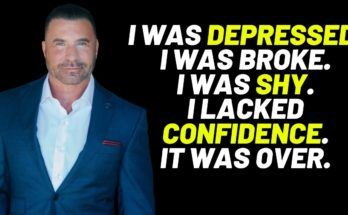Get your FREE real food habits weight loss kit here: http://modernhealthmonk.com/5-habits
——— FOLLOW ME ———-
Email list for free real food weight loss kit: http://modernhealthmonk.com/5-habits
Facebook: https://www.facebook.com/ModernHealth…
Twitter: https://twitter.com/thehealthmonk
This article & references: http://modernhealthmonk.com/exercise-motivation/
———– TRANSCRIPT ————–
“I absolutely hate exercise, and there’s no way in hell you’re going to get me to do it” said Marie, one of my clients.
At the time, I was trying out personal training to see if It could be a potential career. I wasn’t crazy about it, and ended up changing careers, but before I did, I got Marie to exercise 30 minutes a day – every day – by herself, and she actually liked it.
How?
By using psychology.
7 Psychological Keys Behind People That Regularly Exercise
So what separates them from us anyway?
Why is it that Cindy-Lou Hoo exercises all the time, and appears to love it, while the thought of exercise makes me want to projectile vomit?
Here are some interesting (science-supported) facts about those who regularly exercise:
Long-term exercisers crave the feeling after exercise. On sluggish days, mentally thinking about the endorphin rush is a strong motivator for people to continue to exercise. I can also tell you this from personal experience – I actually crave exercise. I sit 10-12 hours a day to work, and once I get off work, I’m craving blood flow. The feeling I get after exercising, the blood flow, the feeling of being awake, the circulation pumping, the relaxed but energized feeling, is something I crave. Interestingly enough, people that are emotional eaters (that like exercise) can effectively replace the craving for food by exercising when they get a craving – because it releases endorphins and dopamine just like eating food does.
Over use of extrinsic rewards (like money) may weaken intrinsic motivation (“I actually like this”), and the benefits tend to decrease over time. This is also known as the over-justification effect – where if we’re paid to do something we inherently enjoy, it tends to decrease our intrinsic motivation to do it. (Stipek, 1996). People are a huge fan of recommending websites like Dietbet and Stickk – where you bet money, and if you lose, it’s either given to someone else, or given to an anti-charity; some kind of charity you hate. In reality, external rewards or threats are not as effective in the long run as sticking with intrinsic motivation – exercise you actually like.
Internal locus of control – Do you feel like you’re in control of life, or life is in control of you? People with an internal locus of control (“I feel in control in life”) are more likely to be successful, motivated, and resilient in the face of stress… which makes sense. If you feel in control of your own successes and failures, it’s a lot more motivating than feeling like whatever you do has no effect. If you feel like the universe randomly is controlling your life, why would you be motivated to keep working at something? Exercisers (and highly motivated people) usually have an internal locus of control. (Eccles & Wigfield, 2002)
Intrinsic motivation – Long term exercisers tend to do it for intrinsic reasons – because they enjoy whatever type of exercise they are doing, rather than simply wanting to look good or impress others. People that are intrinsically motivated to do things are more likely to stick with them over the long run.
The main psychological factor shown in people that adhere to exercise is self-efficacy and self-worth. In other words, the more you think you will be able to do it, and follow through, the more likely you are to do it. Emotions are inseparable from health Trost et al, 2002; Huberty et al 2008; Pintrich & DeGroot, 1990)
Social support or support from a S/O highly linked to exercise adherence. Ever heard of the quote, “You’re the product of the 5 people you surround yourself with most often?” Yep! It’s true with exercise, too. In fact, just being able to watch people around you exercise is associated with a greater likelihood of you exercising. (Trost et al, 2002)
People who overestimate their capabilities from exercise are more likely to drop out. The dieter’s curse is rushing in too soon. (Whaley and Schrider, 2005)



i nvr read comments but hopefully preaching to the choir here but This is one of the best presented videos on this specific topic i have ever seen bro. I just started a job where i help people get in shape in many ways an they always have a bunch of negative thought patterns, myths, and bad experiences that block out my ability to help. I can't wait to show your vid to people. Again thanks for such down to earth yet professional content #Salute
I am so disgusted by sweat, I hate sweating, I hate seeing people sweat, and working out I sweat a lot and it make me want to just shower and stop, is there a trick for that?
This vid is amazing
I love it, look forward to it. how do I put that in other areas? Sometimes I feel blocks or give myself grievances
Thanks so much for this post!
Love this video!
Thank you for this…beneficial video
The advise was good.but the video was kind of dull….and you used too much examples…that's why it was less interesting
You have alot of "why" but no "how"…its not enough to say change the way you think. I can't just spontaniously decide to like excersize when I don't or become intrinsicly motivated when I'm not. There is nothing helpful in your video and I think your title is misleading.
Well said Alex, what I gained the most out of this is that it is actually pretty easy when you really break it down, you just have to apply it and you gave great examples on how. And yes I agree a great tone in your voice!
i think your advice is bang on!
Glad i found this video really i just realised im doing the reward trap kinda.. i hate cardio but really need to get my reflexes up to phase and id really like to be able to run for more than one minute without feeling my chest is on fire.
Nice take I like it
This is excellent insight into the science of motivation. I am a personal trainer, and I feel like often clients can look to someone else to motivate them when they don't realize the power of their own choices. I also agree that the more pleasant of an association we make with exercise, the more likely we are to do it again. There is definitely no hard-and-fast rule about having to exercise for 45 or 60 minutes for it to "count". Whatever you're doing for exercise–if it's more than you did in the past, you're growing and on the right track!
thanks bro
Sweet bro thanks!!!
Actually helpful
Excellent video that makes perfect sense.
Editing was bad